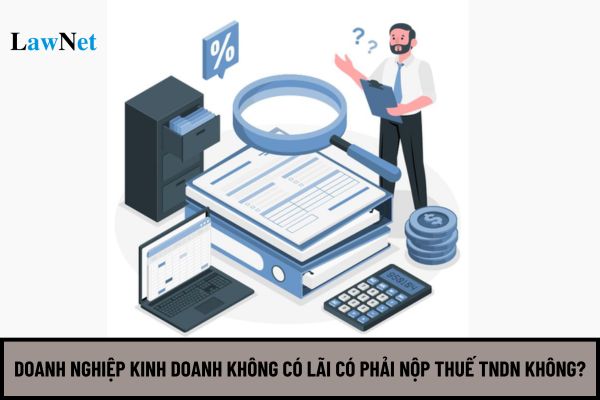Shall an enterprise with no profit pay corporate income tax in Vietnam?
Shall an enterprise with no profit pay corporate income tax in Vietnam?
According to Article 6 and Article 11 of the 2008 Law on Corporate Income Tax, the payable CIT is calculated by multiplying taxable income by the tax rate.
Therefore, whether an enterprise must pay CIT depends on whether its taxable income is positive (Income > 0). This is calculated using the formula:
Payable CIT = Taxable income × Tax rate.
According to Article 7 of the 2008 Law on Corporate Income Tax, taxable income is defined as taxable revenue minus tax-exempt income and losses carried forward from previous years.
Taxable revenue is calculated as revenue minus deductible expenses from enterprise activities plus other income, including income from outside Vietnam (specifically determined under Article 3 of the 2008 Law on Corporate Income Tax amended by Clause 1 Article 1 of the 2014 Law Amending Various Tax Laws).
Thus, if an enterprise does not have a profit from production and enterprise activities and does not generate other income, or if it has sufficient losses carried forward to offset taxable income, then taxable income = 0. In this case, the enterprise is not required to pay CIT.
In cases where an enterprise does not have a profit from its main enterprise activities but taxable income is still positive due to other incomes arising, including:
- Interest from deposits and loans.
- Income from real estate transfers, capital transfers.
- Income from asset liquidation, recovered bad debts.
...
If taxable income is positive, the enterprise must still declare and pay CIT at the current tax rate.
In conclusion, an enterprise with no profit is not required to pay CIT if taxable income is zero. However, if other income arises, causing taxable income to be positive, the enterprise must still pay CIT according to current regulations.
Accurately declaring and determining taxable income, allowable expenses, and other income are crucial factors in calculating tax in accordance with legal provisions.

Shall an enterprise with no profit pay corporate income tax in Vietnam? (Image from Internet)
How to determine an enterprise's revenue for calculating taxable income in Vietnam?
Based on Article 8 of Decree 218/2013/ND-CP, revenue for calculating taxable income is guided according to Article 8 of the 2008 Law on Corporate Income Tax. In which:
- Revenue for calculating taxable income includes the total money from the sale of goods, processing charges, provision of services, including subsidies, surcharges, and premiums received by the enterprise, regardless of whether the money has been collected or not.
- For enterprisees declaring and paying value-added tax (VAT) by the credit method, the revenue for calculating corporate income tax is the revenue excluding VAT.
- For enterprisees declaring and paying VAT directly on the added value, the revenue for calculating corporate income tax includes VAT.
- The time for determining revenue to calculate taxable income for sold goods is when the ownership or usage rights of goods are transferred to the buyer.
The time for determining revenue to calculate taxable income for services is when the provision of services to the buyer is completed or when service provision invoices are issued.
See detailed guidance for specific cases in Clause 3, Article 8 of Decree 218/2013/ND-CP.
What is the current corporate income tax rate in Vietnam?
According to Article 10 of the 2008 Law on Corporate Income Tax, as amended and supplemented by Clause 6 Article 1 of the 2013 Amended Law on Corporate Income Tax and Clause 1 Article 67 of the 2022 Petroleum Law, the CIT rate is specified as follows:
Tax Rate
1. The corporate income tax rate is 22%, except as prescribed in Clauses 2 and 3 of this Article and for subjects eligible for preferential tax rates as prescribed in Article 13 of this Law.
Cases subject to the 22% tax rate mentioned in this clause will apply a 20% tax rate from January 1, 2016.
2. Enterprises with total annual revenue not exceeding twenty billion VND apply a 20% tax rate.
The revenue used as a basis to determine whether an enterprise is eligible to apply the 20% tax rate in this clause is the revenue of the preceding year.
Corporate income tax rates for petroleum activities range from 25% to 50% depending on each petroleum contract; corporate income tax rates for activities in searching, exploring, and exploiting other precious resources in Vietnam range from 32% to 50% depending on each project and each enterprise establishment.
Therefore, the current CIT rate is 20%, except for entities eligible for preferential tax rates.
Specifically, CIT rates for petroleum activities range from 25% to 50% depending on each petroleum contract; CIT rates for activities in searching, exploring, and exploiting other precious resources in Vietnam range from 32% to 50% depending on each project and each enterprise establishment.

